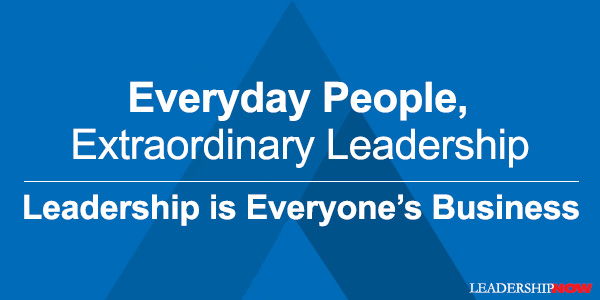 |
 |
03.22.21

Everyday People, Extraordinary Leadership
LEADERSHIP is a mindset—a way of approaching life. It is about how you behave and what you do. It can be taught and then tested and refined in practice. We all have a responsibility to lead in the context we are in. James Kouzes and Barry Posner emphasize this point in Everyday People, Extraordinary Leadership. The book is about what “individuals do to effect change and improvement.” Most leaders do not have titles. And this book is written for them – those people who can and should lead “without the benefit of hierarchical position and rank.” To help you develop confidence and grow as a leader, the authors present an operating system of leadership practices based on their time-tested Five Practices of Exemplary Leadership. Together they define what leaders do. Leadership is fundamentally about your relationships, your credibility, and what you do. Leadership has everything to do about how you behave. The authors share the personal stories of ordinary people who stepped up and behaved as informal leaders. When you read these stories of people from all walks of life who lead at their personal best, they demonstrated a common set of behaviors and actions that the authors have grouped together in the Five Practices: Model the Way
Modeling the Way begins with knowing and being able to articulate your values. But good leadership goes beyond that. “Successfully leading others requires an understanding and affirmation of shared values—the principles that can galvanize and strengthen collective commitment.” Inspire a Shared Vision
To follow your vision, people must see how they can make it their own. You must understand the hopes and aspirations of those you are involved with. You must breathe life into visions, not only by your own enthusiasm and expressiveness but by listening to and communicating the hopes and dreams of others so that they clearly understand how their values and interests will be served. Challenge the Process
Be willing to experiment and learn from your mistakes and setbacks. Identify and remove self-imposed constraints and organizational conventions that block innovation and creativity. Enable Others to Act
You strengthen others when you make it possible for them to exercise choice and discretion, when you develop in others the competence and confidence to act and excel, and when you foster the accountability that compels action. Encourage the Heart
By paying attention, offering encouragement, personalizing appreciation, and maintaining a positive outlook, leaders stimulate, rekindle, and concentrate people’s energies and drive. Encouragement is more personal and positive than other forms of feedback, and it strengthens trust within relationships. The behaviors associated with the Five Practices are not gender, race, or context-specific. Anyone can put these practices into action in their lives and lead with their best selves. Leadership begins by working on you. Start by believing that you can make a difference right where you are and by practicing these behaviors deliberately in your context. It will change you, and you can then make a difference in other people’s lives. 
Posted by Michael McKinney at 10:31 PM
|
BUILD YOUR KNOWLEDGE
 

How to Do Your Start-Up Right STRAIGHT TALK FOR START-UPS 
Grow Your Leadership Skills NEW AND UPCOMING LEADERSHIP BOOKS 
Leadership Minute BITE-SIZE CONCEPTS YOU CAN CHEW ON 
Classic Leadership Books BOOKS TO READ BEFORE YOU LEAD |